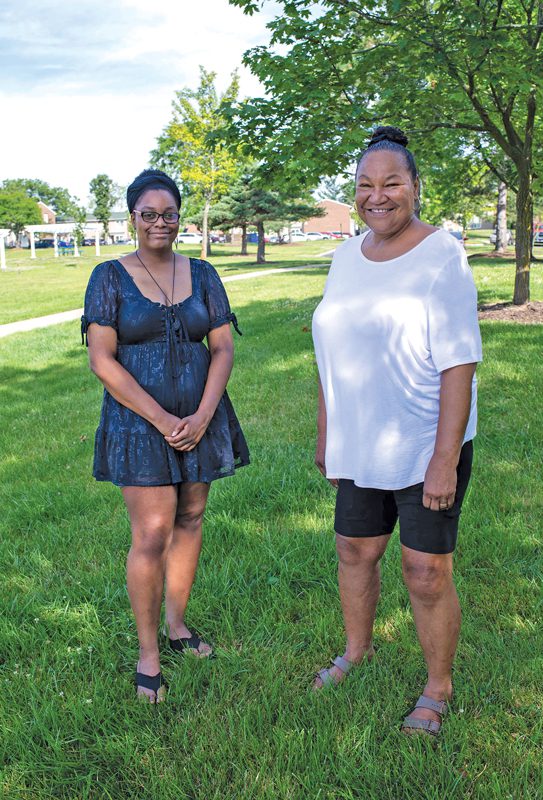
Brianna Murphy and her aunt, Kimberly Baker Crouch, left a historically Black neighborhood downtown for Parkway Meadows in the Logan area. | Photo by Mark Bialek
Earlier this year, Kimberly Baker Crouch’s family sold the house on N. Fourth Ave. that five generations of Bakers had called home, and she and her niece Brianna Murphy moved to an apartment on Ann Arbor’s northeast side.
“It’s amazing how a house can become part of you,” Kimberly says of the move as she sits with Brianna in their new living room surrounded by family photos. The transition was emotional but the pair have found a “peaceful and quiet” oasis at Parkway Meadows apartments, Kimberly says.
Just down Nixon Rd. from Logan Elementary and Clague Middle School, and across the way from Thurston Elementary, Parkway Meadows offers subsidized apartments for low-income residents, is on the AAATA bus line, and is a short walk to Plymouth Rd. shops and restaurants. Kimberly, sixty-five, is a retired nurse’s assistant on a fixed income, and says affordability was a key concern. Brianna, twenty, takes the bus to her job downtown, and likes that Domino’s, Jimmy John’s, and Kroger are nearby. The duo also visit Yoon’s Bakery, with pastries “to die for,” Kimberly says, as well as Carpenter Bros. Hardware, a family-run store where they bought tomato and pepper plants for their patio.
“People are out here walking and exercising every day,” Kimberly says of the apartment grounds. “There was a guy with his walker in one hand and doing Tai Chi with the other. … It’s very inspiring.” She also appreciates the diversity—U-M’s north campus draws international residents. “I call it the United Nations out here,” Kimberly says.
Even though they’ve adjusted well to the move, their old neighborhood is never far from their thoughts. The Baker family’s former home, a Greek Revival house dating to the mid 1800s, is in a historically Black neighborhood north of downtown that was racially segregated until the 1960s. Today, Kimberly says, only three of the original Black families remain.
Kimberly’s family roots run deep in Ann Arbor. Her paternal grandfather, Charlie Baker, moved to the city in 1918 and cofounded the Ann Arbor Foundry, which he ran for more than fifty years. He and his wife Ruby raised twelve kids on N. Fourth Ave., the youngest of whom was Kimberly’s father, Claude Baker. After Charlie died in 1978, Claude moved with his family from Gott St. back to his childhood home to care for his mother—and stayed.
Kimberly and her twenty-four cousins celebrated birthdays and holidays there. “It was so fabulous,” she says of the gatherings. “I mean, it was shoulder-to-shoulder and we didn’t even care.” For Brianna, who was adopted at birth by her grandparents, Claude and Eloise, it was the only home she knew. After Claude died two years ago, the family made the painful decision to sell the home that Brianna wished “could be turned into a historical museum,” and Eloise moved in with Kimberly’s brother in Lyndon Twp.
As they adjust to their new life together, Kimberly and Brianna take turns cooking. Both are trying to get out to walk more. “I like to go sit by the fountain because it’s really calming,” Brianna says.
Kimberly, who has a son in Chicago and lived in St. Louis for many years, says she understands why Ann Arbor tops many “Best of” lists. Despite all of the changes, she says, “I love my hometown.”